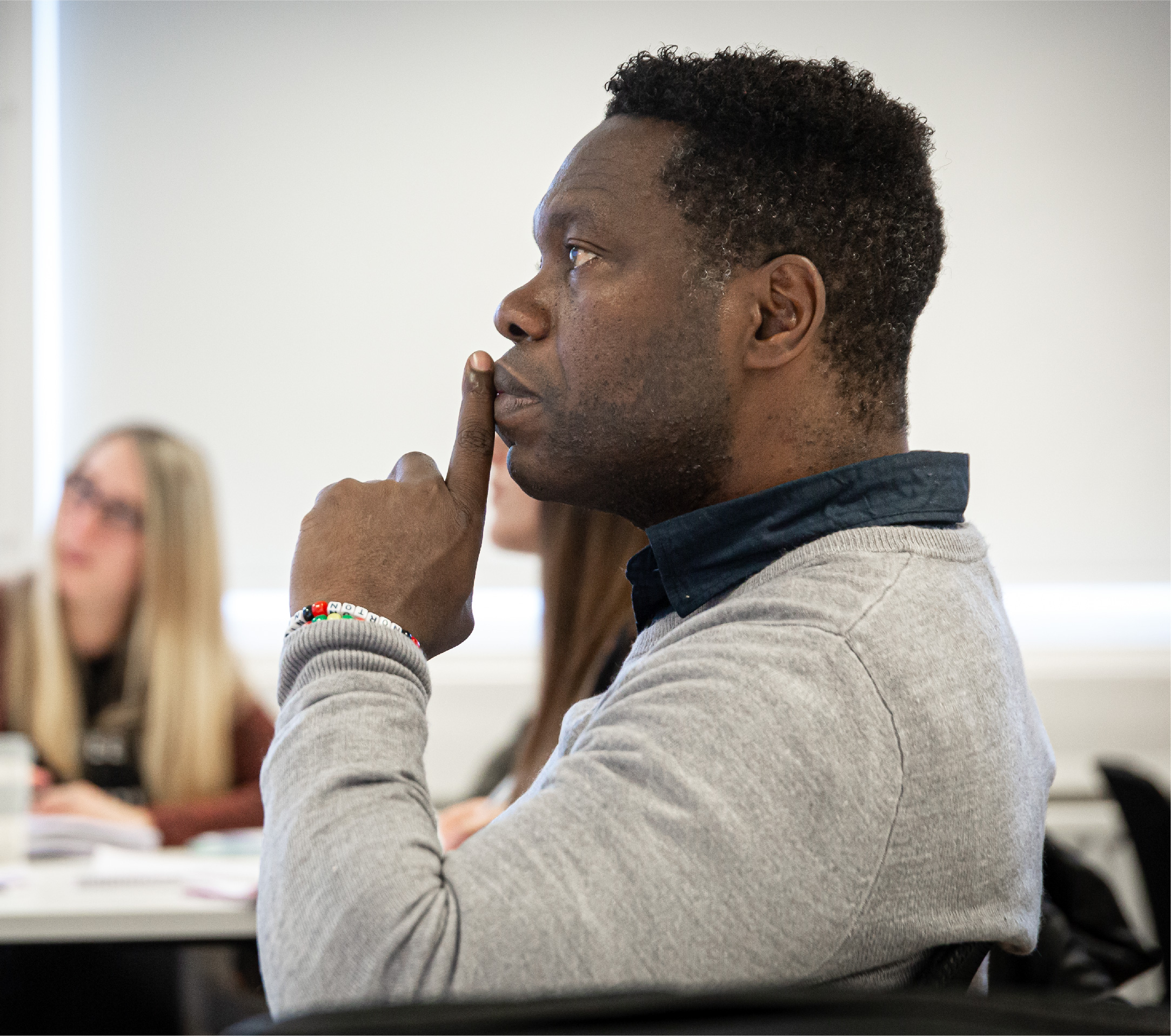Our career-focused assessments will prepare you to address challenges connected to offending behaviour, such as past trauma and substance abuse, providing opportunities for rehabilitation. You’ll be equipped with the skills and experience to make a difference.
of graduates are in work or further study after 15 months
in the UK for Quality Education
The course is professionally accredited by the British Psychological Society (BPS) and, providing you achieve at least a 2:2 in your degree, you will be eligible for Graduate Membership of the BPS and the Graduate Basis for Chartered Membership (GBC), the first step to becoming a Chartered Psychologist.
BPS accreditation is both an important hallmark of quality that is extensively acknowledged by employers in the field, and an essential stepping-stone if you are looking to progress to become a Chartered Psychologist after graduation.
Taking a BPS accredited course is necessary if you wish to pursue a career in psychology or in the wider psychological workforce. For information on the benefits of studying an accredited course, visit the BPS website.
First for jobs
The University of Worcester is first in the UK for sustained employment, further study or both, five years after graduation (excluding specialist institutions) - Longitudinal Educational Outcomes Survey 2024. Read more.
Overview
Our Forensic Psychology pathway will develop your understanding of key psychological concepts while teaching you to apply them in a legal and criminal justice context. You’ll learn why crimes happen, how victims and perpetrators can be affected, and how the risk of further offending can be reduced. You'll study topics like criminal behaviour, witness testimony and investigation techniques, and explore ways in which forensic psychologists assess and treat people who commit crimes.
Our course is professionally accredited by the British Psychological Society (BPS) and has a strong practical focus that will build your professional skills alongside your studies, helping you stand out to future employers. During your studies, you'll be eligible for student membership of the BPS – this will allow you to connect with other Psychology students through networks, online communities and in-person events.
You'll apply psychological theory to the criminal justice system, and will learn to interpret, evaluate and explain information relating to investigation, risk, rehabilitation and criminal behaviour.
Work Experience
We offer an optional work experience placement module in Year Three, enabling you to complete a short voluntary placement with a local organisation. Previous opportunities have included the NHS, the British Psychological Society (BPS), West Mercia Police, Hereford & Worcester Fire and Rescue Service and HMP Aylesbury.
You can also take part in workshops devoted to CV writing, interview skills, recruitment and assessment techniques. You'll have the chance to talk to guest speakers and visit potential employers – as well as getting help to apply for work and postgraduate study.
Course content
You’ll study a mixture of mandatory and optional modules, designed to equip you with an in-depth understanding of forensic psychology and train you to apply your knowledge to real-world scenarios.
Optional modules will run if they receive enough interest. It is not guaranteed that all modules will run every year.
Optional modules
Careers
You’ll graduate as a well-organised, confident communicator, with excellent analytical and critical thinking abilities.
Psychology graduates now work in every area of society, using their numeracy, IT literacy, communication and problem-solving capabilities to add value in their professions.
This BPS accredited degree is the first step towards pursuing a professional career in Psychology. Our graduates are highly successful in securing good jobs in many different fields, from counselling to advertising, to working in the NHS or the criminal justice system.
Postgraduate Training
To practice as a forensic psychologist, you’ll need to complete an accredited postgraduate qualification in Forensic Psychology.
As a qualified forensic psychologist, you'll be ready for a career in the prison and probation services, rehabilitation units and hospitals, young offender institutions, or within the police service.
You can find out more about postgraduate training from the British Psychological Society (BPS).
Other Options
You’ll gain research, analytical and presentation skills that are in high demand in a range of careers, including:
- Probation officer
- Counsellor
- Police officer
- Border force officer
- Social researcher
- Advice worker
- Prison officer
- Secondary school teacher
- Human resources officer
- Mediator
Further Study
Our course also provides the perfect foundation for further study of professional psychology, including on our specialised courses:
- PGCE Secondary Psychology (Teacher Training)
- Counselling MSc
- Psychology MPhil/PhD
Graduate case studies
Our recent graduates reflect on their time on the course.
Course highlights
Teaching and assessment
You’ll be taught through a combination of interactive lectures, workshops, and seminars.
Evaluation isn’t just about exams. You’ll also be assessed through a range of applied methods, such as practical report files, reflective logs and applied learning scenarios, designed to prepare you for your future career.
Teaching and assessment contents
Students are taught through a combination of different learning and teaching methods. Lectures allow for the presentation and introduction of key topics, including both traditional and contemporary sources, which allow students to begin their learning. This is then supported by seminars that enable the discussion and development of understanding of topics covered in lectures. Subject specific skills are the focus of practical classes and workshops (for example, understanding statistical data analysis).
The course also has a keen focus on experiential learning, as there is good evidence that this can greatly enhance the student learning experience. Therefore, such methods will be used such as problem-based learning, whereby students will apply theory and content from psychology to address real world, global issues (e.g. the role of AI in the workplace, tackling climate change and global pandemics). Such global issues will be themes that run through the course, and as such will be covered elsewhere in other learning and teaching.
Furthermore, the role of research in the learning and teaching methods of this course will be central to all areas. Such research-informed teaching and learning will include practical research classes where students put into practice research methods they have learnt as well as focusing on research in directed study, group activities, assessments and problem-based learning.
The University places emphasis on enabling students to develop the independent learning capabilities that will equip them for lifelong learning and future employment, as well as academic achievement. A mixture of independent study, teaching and academic support from Student Services and Library Services, and also the Personal Academic Tutoring system enables students to reflect on progress and build up a profile of skills, achievements and experiences that will help them to flourish and be successful.
In addition, meetings with Personal Academic Tutors (PAT) are scheduled on at least four occasions in the first year. This will include two group sessions as part of modules, and individual meetings. Students are scheduled to meet their PAT’s on three occasions in each of the other years of a course.
Meet the team
Just a few staff members from the wider team of psychology lecturers.
Entry requirements
UCAS tariff points required: 112
| Qualification | Grade |
|---|---|
| A-level | BBC |
| BTEC National Extended Diploma | DMM |
| T-level | Merit |
We do accept Access to HE Diplomas and other qualifications which may not exactly match the combinations above. Work out your estimated points with the UCAS tariff calculator.
Any questions?
If you have any questions about entry requirements, please call our Admissions Office on 01905 855111 or email admissions@worc.ac.uk.
Fees
Fees contents
UK and EU students
The Government has announced that it will increase tuition fees and maintenance loans by 3.1% from the 2025/26 academic cycle. Subject to approval, the University intends to increase our tuition fees in line with this and as per our terms and conditions. This means that from September 2025 the standard fee for full-time home and EU undergraduate students on BA/BSc/LLB degrees and FdA/FdSc degrees will be £9,535 per year for new and continuing students.
For more details on course fees, please visit our course fees page.
International students
The standard tuition fee for full-time international students enrolling on BA/BSc/LLB degrees and FdA/FdSc degrees in the 2025/26 academic year is £16,700 per year.
For more details on course fees, please visit our course fees page.
How to apply
How to apply contents
Applying through UCAS
UCAS is the central organisation through which applications are processed for full-time undergraduate courses in the UK.
Read our how to apply pages for more information on the application process, or if you’d like to apply for part-time study.
- Forensic Psychology BSc (Hons) - C816
Contact
If you have any questions, please get in touch. We're here to help you every step of the way.

Admissions Office
admissions@worc.ac.uk01905 855111More to explore
Open Days
Visiting us is the best way to get a feel for student life at the University of Worcester.

The City of Worcester
Worcester is a welcoming university city with great transport links and plenty of student parking.

Accommodation
Benefit from our accommodation guarantee. We have rooms on campus to suit every budget including en-suite options.












